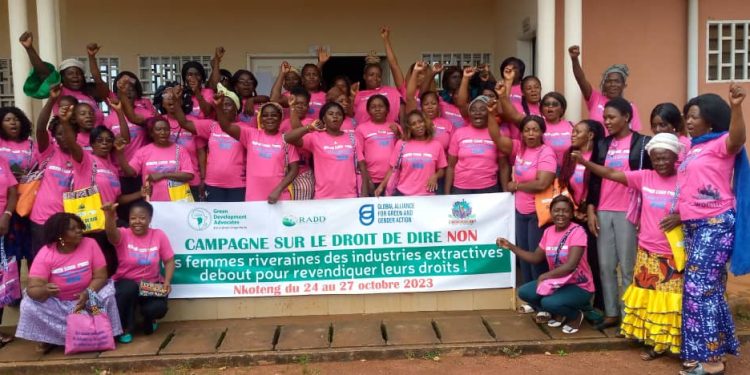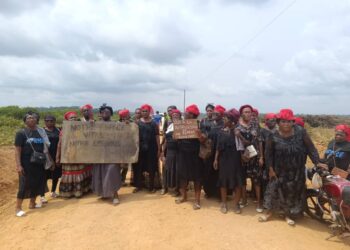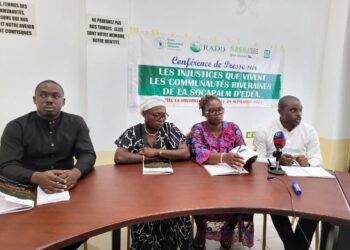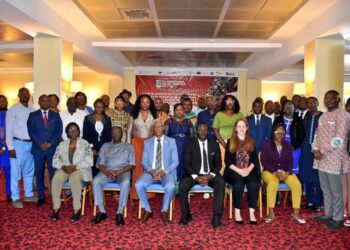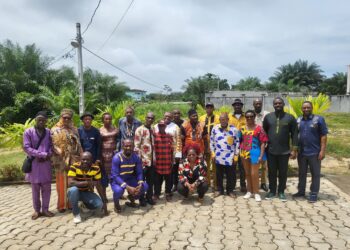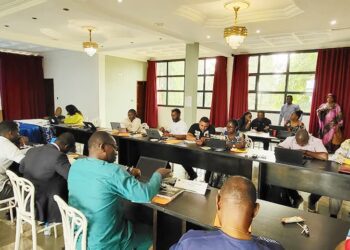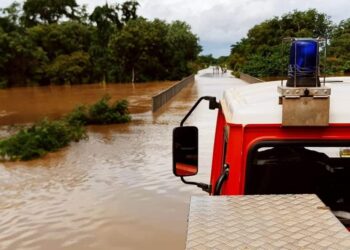Story, Louvier Kindo Tombe
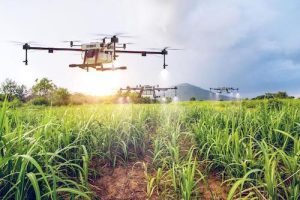
Whenever November approaches, inhabitants of the different villages surrounding the Nkoteng sugar-cane estate in Cameroon go through instances and feelings that make life hard to get through. It is the beginning of the sugarcane harvesting and processing period by the sugar production company – SOSUCAM.
“During this period, River Doua, the main river supplying water to our village and where we usually fish, turns black, and is contaminated with maggots as a result of the activity,” says Ebo’o Tsala Marthe, an indigene of Essoboutou village in Nkoteng.
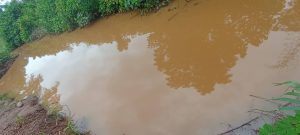
“We have been deprived of one of our key source of livelihood.”
Essoboutou, is the village harbouring the headquarters of SOSUCAM in Nkoteng. The contaminated river is source of numerous health challenges in the village that have led to the death of many. Agricultural products are destroyed when the company embarks on spraying the sugarcane plantation with toxic chemicals. The entire Essoboutou village, is suffering from the activities of the agro-industry.
“I can’t mince words, nothing is working hear for the good of my community, and all our efforts to remedy the situation are yet to yield fruits,” says His Majesty, Benoît Bessala Bessala, 2nd Class Chief of Nkoteng.
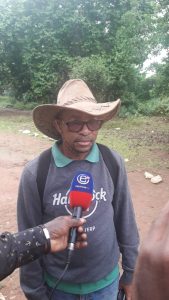
The sufferings of Communities around agro-industries and major development projects in Cameroon are alike.
“The situation with us is even worse where the Palm Oil production company, SOCAPALM, has decided to send us to our early graves”, says Nyangon Nsombo Judith Therese, victim of SOCAPALM’s activities in Kienke – Kribi, South region of Cameroon.
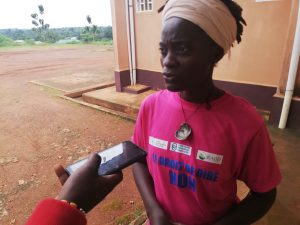
“We were noted for fishing activities especially crayfish, but today the activity is almost inexistent as SOCAPALM has polluted the rivers around. Even the forest where we usually harvest Non Timber Forest Products (NTFP) has been destroyed.”
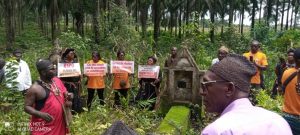
In Batchenga, around the Nachtigal Hydro Power Dam Project, the predominantly fishing community have been denied access to the Sanaga river. “That is where sand miners from the community used to exploit”, a woman from the locality told News Upfront adding that “the promises they made to us are not being respected”.
Community call for better livelihood
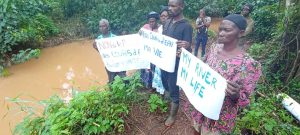
In Cameroon, women and communities are loosing their lands, lives and livelihoods against major developmental projects and agro-industries. Communities, and women specifically, are denied the right to give or withhold consent for large-scale extractives projects on a free prior informed and continuous basis. Such projects are promoted as the development pathway out of poverty across the country promising communities’ local development and jobs. Instead the reality is increased poverty and inequality, ecological destruction, climate change and dire social impacts such as forced dislocations, loss of access to natural resources necessary for survival, ill-health, and increased violence.
Women are affected in particular ways because of their responsibilities for putting food on the table, for caretaking water and forests, and caring for others. Their unpaid labor is further stretched when ill-health and violence increase and when livelihoods are threatened.
When communities resist, some corporations create community division and intimidate, threaten, and even arrest and detain activists and community members. Within these struggles, women endure sexualized forms of violence and rape. Women’s critical demand is for control over their bodies as territory.
“Women weild the power to change the narratives, and they can do it,” says Marie Crescense Ngobo, Executive Director of the Network of Sustainable Development Actors (RADD).
She was speaking during a two-day-training workshop in Nkoteng, Center region of Cameroon organized in partnership with civil society organization Green Development Advocate (GDA), with support from WoMin African Alliance and Global Alliance for Green and Gender Action.
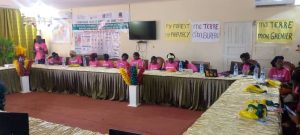
Focus of the workshop that held on October 25 and 26, 2023 was to train representatives from women riparian associations in Cameroon in “The Right To Say No”. Close to 50 women and girls living around rubber, oil palm, sugarcane and forest exploitation agro-industries across Cameroon attended the training workshop.
“I want to thank the organizers of the workshop for helping us realise that we have the right to say no to projects that are detrimental to our wellbeing,” Esther, a peasant farmer in Edea, around the SOCAPALM plantation told News Upfront.
The women were told that the right to say no in this context is born through resistance and so it is very centrally about power and a challenge to those who hold and use power destructively. Saying NO challenges systems of power and claims the right of communities to define their own interests and their own futures.
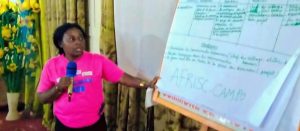
The campaign on The Right To Say No was initially launched by WoMin African Alliance which works to deepen resistance to specific destructive extractives mega projects.
During the workshop, experts from Green Development Advocate drilled the women on how to say NO. MBA MBIA Danielle in her presentation said “there is a YES behind the right to say NO”.
Saying NO passes through negotiations and for the women to go to the negotiation table, “they need to first of all identify their problems and possible solutions, identify key actors neccesary to broker the situation, form alliances, before drafting a complaint to table to the powers that be”, Ekane Nkwelle project manager at GDA added.
The riparian community women presented challenges from their respective communities and we’re encouraged to emulate the process of saying NO, in denouncing injustices related to the activities of agro-industries and major development projects.
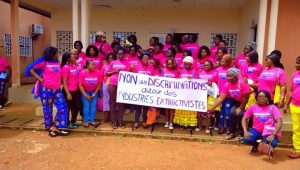
“We encourage you to work together when one of you have an issue,” Marie Crescense Ngobo told the different representatives of the community associations.
The Nkoteng training workshop it should be noted was one in a series organized in Cameroon, and the most recent was in June 2023. Before seperating from Nkoteng, the women committed themselves to share the knowledge acquired with their peers upon their return. They also agreed to set up a national network where they can speak one voice and look in one direction in the quest for better livelihood.
